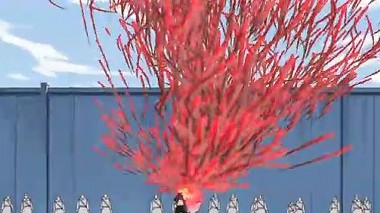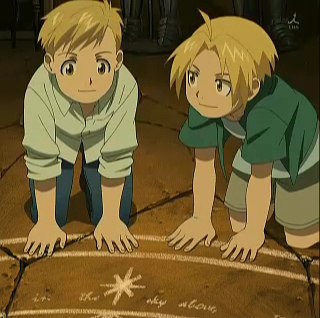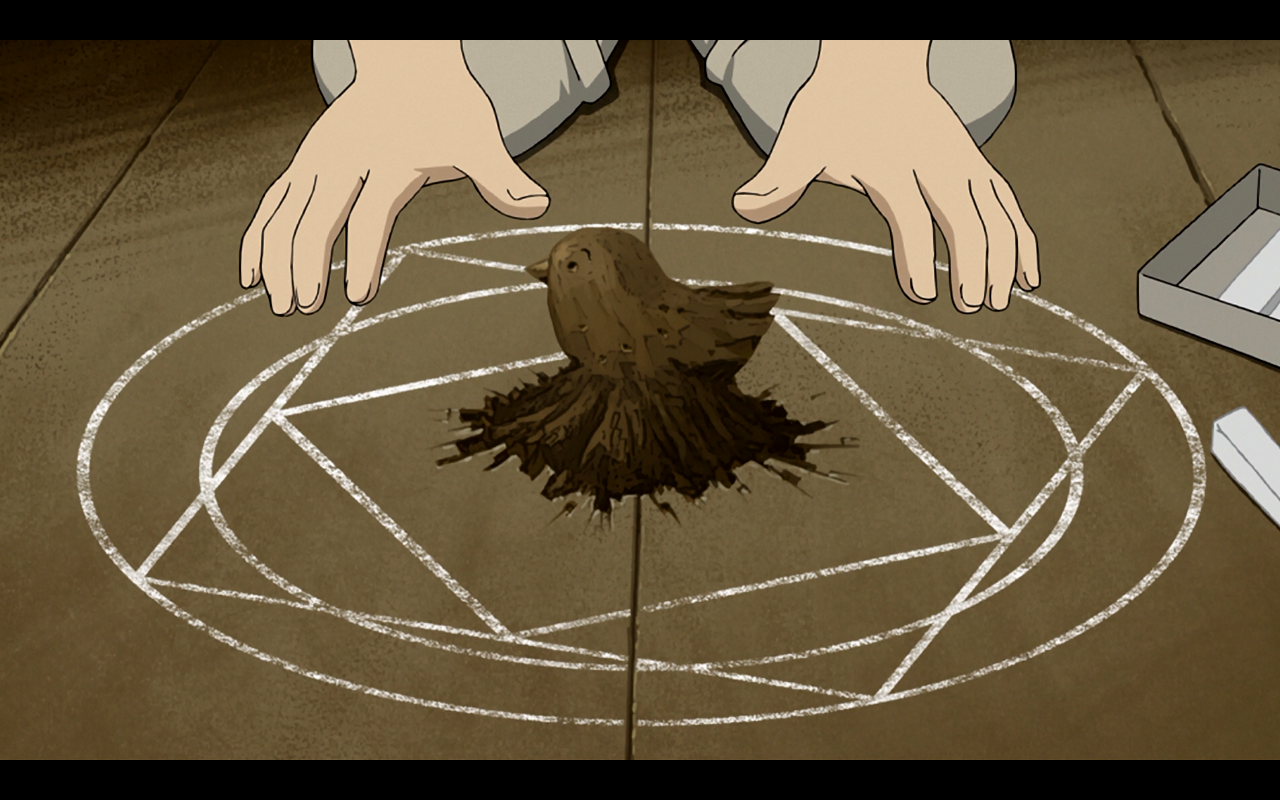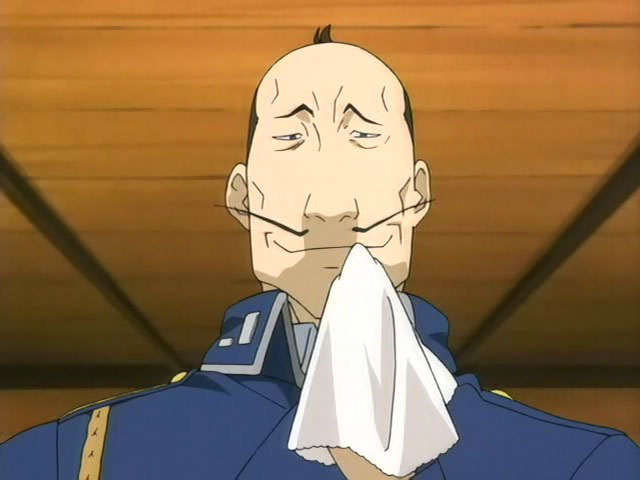Appendix: Japanese interpretations
Before starting this series I googled “philosophy of fullmetal alchemist,” but I didn't come up with much, so my previous two parts in this series may very well comrpise the fullest philosophical treatment of this series in English. However, there's a lot more material available in Japanese. After writing the main body of this post – to keep my interpretation original – I gave 「鋼の錬金術師 哲学」a try. Here's some of the top results.
Kira Alicetear says that she (?) feels an affinity for the military characters, specifically those in Mustang's crew. “I particularly like that the Flame Alchemist is cold on the outside but burns with passion on the inside, and I like Hughes too, but that might just be because I've always had a thing for men of action.” She's not sure how she feels about Hawkeye because, except for her romance plotline, there's little connecting her to the main story. “Oh, and I like Scar and Izumi too.”
“But I think the real reason I came to like Fullmetal Alchemist...was its world.” She explains the principles of touka koukan, using, as I do, the example of a chemical equation. She makes the additional point that for a chemical reaction to occur, some kind of energy is required, speculating that it may come from living organisms. When watching the anime, she thought that the concept was similar to something she'd heard of before, but only remembered when she went to read the tankoubon.
“It was similar to the essence of the Study of Logical Philosophy.” Oh for fuck's sake, now she's talking about Wittgenstein. I guess that means I was onto something when I was ranting about him earlier, but on the other hand, Wittgenstein. Go away, Wittgenstein, go away. “Although I've never actually read Wittgenstein's book 'Tractatus Logico-Philosophicus.'” You're better off, sweetheart. Next part's hard to translate – I think it says that in Wittgenstein, the interaction of language and the world form the figurative “map?” And that the one-to-one correspondence of language and events is similar to the system of alchemy. Another example:
“Language (the internal structure of a proposition) → (Wittgenstein's logical method) → the World (the internal structure of events)”
“The first example [of the chemical equation] and the second example can have a (logical) one-to-one correspondence, and Wittgenstein's logical method corresponds to military drilling. Thus you can conclude that alchemy exists currently (logical philosophy), and that so do alchemists (Wittgenstein). Lol.”
“In Wittgenstein's logical method, you can say that the world and language are of equal value. If you put this to practical use, it means that if the internal structure of the world changes, the internal structure of language changes along with it.” Sure. If language exists to describe the world, then naturally it must change to suit the times. “However, if the internal structure of language changes, the internal structure of the world that it indicates changes with it as well.” I can dig that, too. As far as I can tell language both drives and reflects culture. However, Kira seems to say that the relationship is not quite the same, because in Wittgenstein, “'there is only one interaction between the real world and language,' that is, an equivalent value that goes in only one direction.”
Having said all this, Kira still believes that we can “smash” Wittgenstein's philosophy. “That is to say, there exists a society that can only be seen as a glimpsed fantasy of 'if the internal structure of language changes, the internal structure of the world changes.' It's Japan. A society that satisfies this theory existed 1000 years before Wittgenstein. The so-called 'belief in the soul of language,' and societies with taboos, are certainly fantasies, at the very least it is thought that songs and words have influenced Japanese culture.” OK, you grabbed my attention with the bold, no-frills declaration of “it's Japan,” but are you going to at least justify how this is specific to Japan and not just world cultures in general? “I've strayed from my main point.” I guess not.
“Touka koukan is not the only resemblance between the world of Hagaren and the logic of Wittgen.” Now she explains the taboo of human resurrection and its impossibility. This is because of the law of touka koukan, which prevented the brothers' mother from actually returning to the world of the living in spite of their successfully creating a human body. “In the logic of the world (Truth) that cannot be reached simply through the one-to-one correspondence of language and the world, the frustration of these two alchemists (Ed and Wittgenstein) is very similar.” I think I know what she's referencing. Wittgenstein believes that words are insufficient means for describing/understanding the world, saying that once you have understood something you must discard the linguistic steps you took to get there or as he puts it “[he] must so to speak throw away the ladder after he has climbed up on it.”
She also mentions that some of Wittgenstein's ideas seem to be contradicted by Goedel's incompleteness theorem, “though it was written in Goedel's book that Wittgenstein actually misunderstood the incompleteness theorem,” but that this allowed Wittgenstein to move closer to his “language game” concept – much as Ed and Al were able to use their mistake to move closer to the Door of Truth.
The first respondent identifies the theme of karmic retribution, represented in the rules of touka koukan. There is a conflict between absolute rules and morality, and the morals of the main characters usually win out. Kimblee seems to be a mouthpiece for Arakawa. He preaches that humanity should own up to its failings and not avert its eyes from the dirty things it has done. In his last moments, Kimblee allows the brothers to succeed. You could look at this as either opportunism, or an interesting conclusion. However, she seems not to have put any hidden meaning in Hagaren, and it is probably just as it appears (though I, Rude Boy, hasten to note that this is different from there being no meaning).
The second respondent finds it interesting that all attempts at human resurrection fail without exception. This view of death must have been something Arakawa wanted to get across. Also, “zen to ichi” seems to have been inspired from the ideas of the ancient Hellenistic societies.
“Alchemy comes up often in discussions of the history of engineering.” I would not have guessed that. “The worldview of alchemy explains the achievements of classical mechanics and Newton.” Wait, people study the history of engineering? “The 'touka koukan' idea from Hagane no Renkinjutsushi explains the viewpoint of engineers.”
“Like, the 'touka koukan' idea from Hagane no Renkinjutsushi, you know?
“Basically touka koukan = you have to have something of equal value to exchange, you know?
“To obtain, something of equal value must be lost, you know? < Anime.
“People cannot obtain anything without first giving something up, you know? < manga. That is, 'logic = the path that people must protect.' It's wonderful!”
“I wonder if Philsophy is required material for Engineering?”
“Philosophy and Biology are kind of the same, aren't they. Both desire to understand the roots of the world. Likewise, the alchemists of Hagaren attempt to understand the truth of the world. I'm sure our teacher must have felt something from Hagaren, to have written such a textbook. Ahh, I'd really like to hear what our teacher thinks of the philosophical themes in Hagaren if s/he were to read it...!”
Oh, here's a relatively recent analysis, from just this last year. Motoharu tells us that she – let's just say she unless I hear otherwise – greatly enjoyed the manga, but that there were a few points she just couldn't accept. Her first question has to do with Ed and Al's activities from the middle of the story to the end, when they confront Homunculus, and Hohenheim. The second question is Ed's reasons for destroying his alchemical knowledge in the climax.
There are two main differences between Hohenheim's alchemy and Homunculus's. First, Hohenheim's seems more similar to Eastern Alchemy, whereas Homunculus leans more towards Western Alchemy. Second, and more importantly, in Hohenheim, and only in Hohenheim, the sacrificed Xerxesians seem to accept his actions, and join the fight. “In other words, Homunculus does not acknowledge that his (supposedly) unlimited power comes from human sacrifice, but Hohenheim gains their approval by asking for permission? You can think of Hohenheim's gaining consent through dialogue as deception on his part.” Because at the end of the day, he's still using their stolen lives.
Motoharu surprises me by suddenly announcing that you can look at Hagaren through a Marxist analysis. I think I kind of see where this is going, if we're taking the touka koukan angle. Oh, yeah, we're taking the touka koukan angle. If Person A wants something, and Person B has it, Person A must have something of equal value to offer to Person A in order to get it. “These are the absolute basics of economic theory.” Ha! Now she's using the Youswell example, just like I did. She makes the interesting point that there is some degree of arbitrariness in attempting to come to a consensus when making a trade, which is certainly true, since individuals place varying worth on the same things; you or I would probably look on Hagaren merchandise as quite valuable, but Great Aunt Gertrude might not feel the same way.
Similarly, there's clearly a huge difference in value between coal-mining rights and one night's lodging at an inn, demonstrating that time is not valuable in the sense that other things (like money) are valuable. “Let's call this 'the timeless exchange paradigm.'” I think this might be referencing the Marxist point that labour is implicitly (and thus unequally, and perhaps unfairly) assigned a value based on the value of the goods being produced. “This means that based on the concept of time in relation to the timeless paradigm, the concept of 'the accumulation of capital' does not exist.”
“Incidentally, this paradigm changes in the middle of the story.” While at first Philosopher's Stones appear to “ignore (or overcome)” the law of equivalent exchange, we eventually learn that they are actually just a store of power, “like a bank.” Even the seven homunculi are beholden to the limitations of this seemingly inexhaustible power, as is Hohenheim and, for that matter, even Homunculus himself. “At this point, the 'timeless exchange paradigm' becomes the 'within-time exchange paradigm.'” I'm having trouble following her myself, so it's probably even harder trying to do it secondhand and in translation. I'm sorry. I'm trying. Ah! Here we go: Homunculus and Hohenheim are huge stores of power, to the point that they seem to have actually escaped the constraints of touka koukan, but, in reality, are still bound by them. So, if I'm reading this right, she's trying to tell us that Hohenheim and Homunculus represent bigwig capitalists, who are still, no matter how much capital they may accumulate, bound by the rules of economics?
There is, however, a fundamental difference between the two: Homunculus views his accumulated souls as tools to be used, and Hohenheim looks at them as individuals (Kantian ethics!!). Oh, but in the end she says that she finds the story of Hohenheim and the brothers managing to overcome the practically omnipotent Homunculus to be a stale and hackneyed development. Well, I'm not sure what else she thought might happen. Whatever other surprises the series held for me, I was always always pretty sure that the heroes would pull through in the end somehow. She concludes the post with some mentions of “violence” and how she finds it vexing that Homunculus is able to succeed in reaching the moon by using it as a tool, and something about parental abandonment vis-a-vis Homunculus/Hohenheim and Hohenheim/Ed and Al, but it's less coherent than the rest of the post. She also doesn't address her second question of why Ed destroyed his Door of Truth and I can't find a Part 2 anywhere, so I'm not sure what's up with that.
This site here contains three densely academic pieces containing a lot of stuff I had to look up, so my explanations may not be up to par, and also we won't go into as much depth because they're kind of hard for me to translate. All three deal with Hermeticism, a brand of philosophy I've heard of but never studied. As the one user noted earlier, referring to God as the All or the One, as in Hagaren, is very Hermetic. It's not dissimilar to Tillich's God, in that He is neither a single all-powerful God nor manifested in a pantheon of lesser gods but rather is all over the damn place all the time. Among other things, it also has a stance on alchemy, which it views in the wider context of chemical reactions – again, like Hagaren. More importantly, it reveals the truths of life and death, and is one of the trinity of disciplines essential for understanding the world, the other being astrology and theurgy (magic). Theurgy is the gods, astrology is the stars, and alchemy is the sun, which recalls the scene in Xerxes when Edward explains the symbolism of the stone slab to the military guys.
Fulcanelli - a guy who wrote a bunch of stuff in the 1920s. According to the article, he was a 20th Century...um, alchemist. K...ay. And the final Hermetic philosopher of that era as well. One of his extant works deals with alchemy and Kabbalah, the true secrets of which are hidden in Notre Dame, a seat of power for the Freemasons. Really just kind of losing credibility with every sentence here, aren't we. It throws out a bunch of other names too, ask in the comments if you want to know what they are. It concludes with a story of a doctor he once knew suddenly approaching Fulcanelli on the street, in 1954, when that doctor should have been 113 years old, but “certainly didn't look it.”
Jakob Bohme - a Lutheran theologian. I don't know, I'm looking over this stuff, and a lot of it – like that humans have fallen from a state of grace to a state of pain thanks to original sin, and that demons are fallen angels – I mean I just thought that stuff wasn't Bohmean thinking but more just, you know, the Bible. But that's why I undertook this little exercise. Also, though the author does claim that Bohme is a totally Hermetic kind of a guy, this whole entry is mostly just a long story with no discernible connection to either Hagaren or alchemy, so let's move on.
Isaac Newton - noted mostly for things like revolutionizing the discipline of physics and inventing calculus, but for whom these pursuits were really just diversions in the path of his true goal: learning to transmute lead into gold, despite the fact that this had been pretty conclusively proven impossible decades earlier. There's mention of the Fellowship of the Rosy Cross, which – I mean, seriously, first the Freemasons, now this? What's going on with all this conspiracy theory stuff? Newton wrote something called “Philosophiae Naturalis Principia Mathematica.” Ah, guys, if I could interject, I know “natural philosophy” has “philosophy” in the name, but come on now, please let's be serious.
So here's a guy named Tatsuya. The site layout is extremely pink and his banner is a cute fluffy bunny. I'm not even going to going to question it.
He explains the manga quote that gave birth to the monologue that opens each episode of the 2003 anime, and restates it as “People cannot mature without pain,” or, no pain, no gain, as we would say in English. “And you can say the same thing in business,” because you have to learn from your mistakes in order to advance. Well, I'm not sure that that's a principle that's specific to business exactly, but true enough. In other words, “you can overcome difficulty if you're prepared to face up to it,” which seems kind of obvious, but you know.
Claims that the heart of alchemy is self-transformation more than anything, which you could certainly make an argument for given the events of Hagaren. It also mentions that you can separate a human being's daily life into the separate components of the morning, afternoon, and night, which are classified as “niguredo,” “arubedo,” and “rubedo,” respectively. I don't know what those are in English (they're obviously Japanized from another language entirely), but they seemed kind of important, so let me know if you have any ideas.
UPDATE: An Anonymous commenter clued me in: The words are "translated for the Latin words nigredo, albedo, and rubedo. They along with citrinitas are the 4 stages of alchemy. They roughly translate into English as the blacking (nigredo), the whitening (albedo), the yellowing (citrinitas), and the redding (rubedo)." They correspond to decomposition, purification, transmutation, and success. (There's some stuff in there about Jung as well, but I don't think that exactly concerns our philosophical enquiries.) During his kerfuffle with Scar, Armstrong lays out a very similar, but slightly simplified sequence of understanding -> decomposition -> recomposition, so Arakawa's sort of showing her work here. I gather that this site is contending that the stages it identifies are intended as analogues to the progression of a person's internal transformation, or, more generally, to the progress of a work of creativity or labour. So, even in something fantastic and fictional like alchemy, we can still find something thought-provoking and relevant to our own lives.
UPDATE: An Anonymous commenter clued me in: The words are "translated for the Latin words nigredo, albedo, and rubedo. They along with citrinitas are the 4 stages of alchemy. They roughly translate into English as the blacking (nigredo), the whitening (albedo), the yellowing (citrinitas), and the redding (rubedo)." They correspond to decomposition, purification, transmutation, and success. (There's some stuff in there about Jung as well, but I don't think that exactly concerns our philosophical enquiries.) During his kerfuffle with Scar, Armstrong lays out a very similar, but slightly simplified sequence of understanding -> decomposition -> recomposition, so Arakawa's sort of showing her work here. I gather that this site is contending that the stages it identifies are intended as analogues to the progression of a person's internal transformation, or, more generally, to the progress of a work of creativity or labour. So, even in something fantastic and fictional like alchemy, we can still find something thought-provoking and relevant to our own lives.
*
That's it for my philosophical analysis of Fullmetal Alchemist. I originally intended it to be, like, maybe 2000 words, all in one post, but then somehow I got going and it just turned into this monster. My most popular post ever, week in, week out, has been that stupid fucking Evangelion analysis that I wrote in ten minutes and then vomited onto the Internet, so in all likelihood this three-part series will now ensure that four of my top five posts will be anime-related, forever. I guess that's all right, especially if a few visitors end up staying. Point is, I hope you enjoyed this short series, and see you again.
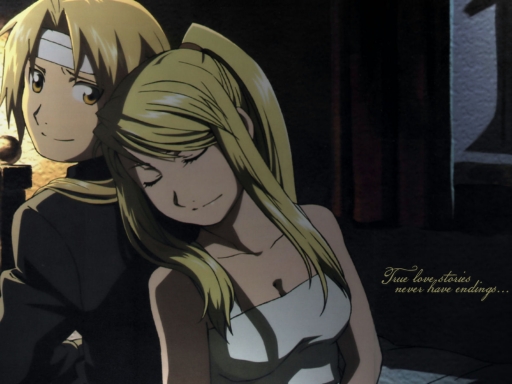







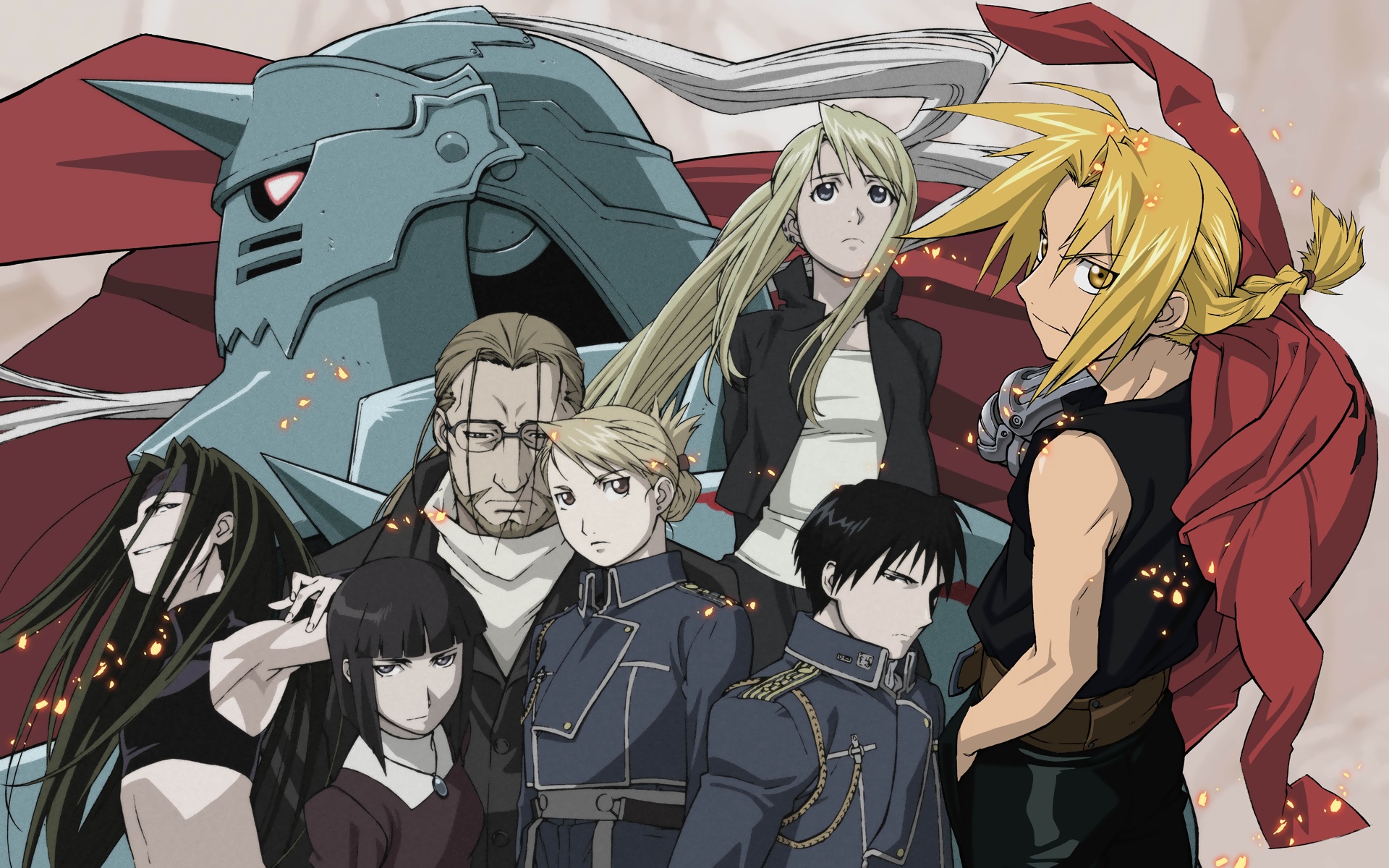
.jpg)


